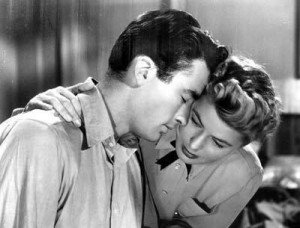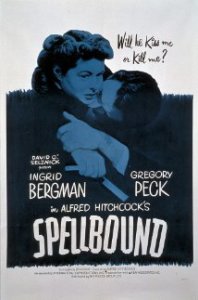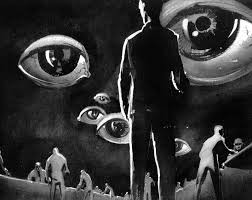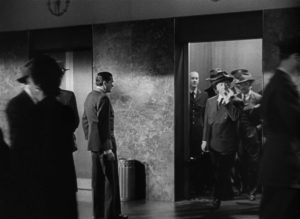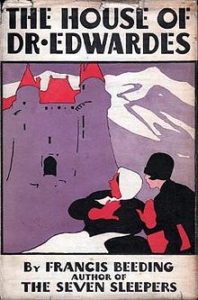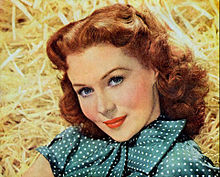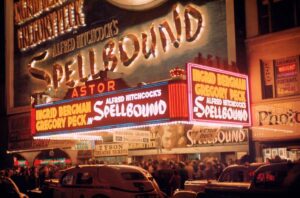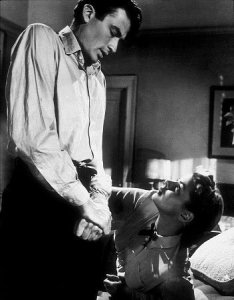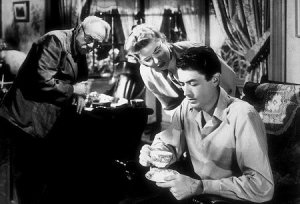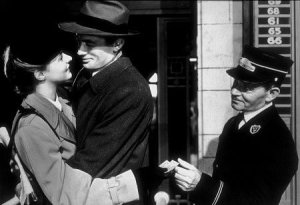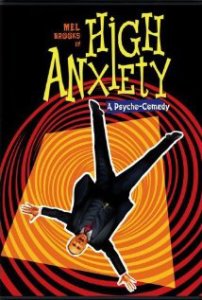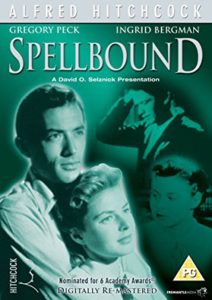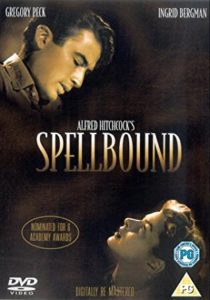Spellbound ***** (1945, Ingrid Bergman, Gregory Peck, Leo G Carroll, Michael Chekhov, Rhonda Fleming, John Emery, Norman Lloyd) – Classic Movie Review 101
‘This is love! Complete…reckless…violent,’ screams the poster as Alfred Hitchcock embarks in 1945 on another delicious tale of obsession and trauma. Spellbound scored six Oscar nominations and won one, for Best Music, Scoring of a Dramatic or Comedy Picture.
Ingrid Bergman stars in Hitchcock’s captivating romantic thriller and Freudian fantasy as the lovely but starchy Dr Constance Petersen, who works for the Green Manors mental asylum, where the boss is about to retire. His replacement, Dr Edwardes, arrives at the institution. But the man who says he is Edwardes turns out to be an impostor, a paranoid amnesiac called John Ballantyne (Gregory Peck).
In what doesn’t quite seem to be the ideal doctor-patient relationship, Dr Petersen is attracted to the dashingly handsome young Ballantyne. And soon the duo set off to tackle his amnesia and childhood trauma to prove he’s not a murderer by trying to discover what really happened to Edwardes.
Adapting Francis Beeding’s novel The House of Dr Edwardes, screenwriters Ben Hecht and Angus MacPhail come up with an engrossing screenplay, both entertaining and clever, as Hitchcock digs deep into his book of Freud and his bag of cinematic tricks for what he called ‘the first picture on psychoanalysis’. So, this is a bit of a pioneering movie from Hitchcock, and not for the first or last time.
The enchanting romantic dream team of Bergman and Peck at their most devastatingly handsome works a treat. Both of them show what distinguished screen actors they are, as well displaying their charms as great movie stars. For once, Hitchcock was happy with his actors. He and Bergman always remained friends and she introduced him at his Oscar lifetime achievement ceremony.
The film is full of treats. George Barnes’s black and white cinematography is luminously super-sleek – and the public enjoyed the novelty of seeing a gun-flash in colour in the original version. The Oscar-winning Miklos Rozsa score is delectably eerie. And there is no doubt that Salvador Dali’s famous two-minute Surrealist dream sequence (supervised by William Cameron Menzies) is a delightful and memorable adornment, more than just a mere gimmick.
The film may be ‘just another manhunt story wrapped up in pseudo-analysis’, as Hitchcock mock-modestly pointed out. But it is a slyly playful and sophisticated Hollywood entertainment, with fascinating links to Rebecca, Vertigo, Rear Window and Marnie.
Also in the cast are Jean Acker, Leo G Carroll, Michael Chekhov, Rhonda Fleming, John Emery, Norman Lloyd, Donald Curtis, Steven Geray, Paul Harvey, Erskine Sandford, Victor Kilian, Bill Goodwin, Art Baker, Wallace Ford, Regis Toomey, Addison Richards, Irving Bacon, Joel Davis, Jacqueline deWit, Dave Willock and Janet Scott.
Hitchcock’s cameo is as the Man Leaving Elevator in the scene set in the lobby of the Empire Hotel about 43 minutes into the film. Hitchcock is seen exiting the elevator, smoking and carrying a violin case. He walks to his left and disappears to the right of frame.
Hitchcock also carries a musical instrument in The Paradine Case (1947, cello case), Strangers on a Train (1951, cello case) and Vertigo (1958, bugle case).
Spellbound is directed by Alfred Hitchcock, runs 116 minutes, is made by Selznick International, is released by United Artists, is written by Ben Hecht (screenplay) and Angus MacPhail (adaptation), suggested by novel The House of Dr Edwardes by Francis Beeding [John Palmer and Hilary Aidan Saint George Saunders], is shot in black and white by George Barnes, is produced by David O Selznick, is scored by Miklós Rózsa, and is designed by James Basevi and John Ewing, with special effects by Jack Cosgrove and dream sequence based on designs by Salvador Dalí.
Spellbound is notably spoofed in Mel Brooks’s High Anxiety, along with other Hitchcock movies.
Miklós Rózsa won three Oscars: for Spellbound (1945), A Double Life (1947) and Ben-Hur (1959).
The House of Dr Edwardes is a 1927 psychological thriller novel written by John Palmer and Hilary Aidan Saint George Saunders, under the pseudonym of Francis Beeding, with the doctor originally called Dr Constance Sedgwick.
Rhonda Fleming received her first substantial role in Spellbound as Mary Carmichael, a patient at Green Manors. She recalled: ‘Hitch told me I was going to play a nymphomaniac. I remember rushing home to look it up in the dictionary and being quite shocked.’
Marilyn Louis was discovered by Hollywood agent Henry Willson, who changed her name to Rhonda Fleming. ‘He stopped me crossing the street. It kinda scared me a little bit. I was only 16 or 17. He signed me to a seven-year contract without a screen test.’ Willson worked for producer David O Selznick, who gave her a contract.
RIP Rhonda Fleming, who died on 14 October 2020, age 97. She was in both Out of the Past and Spellbound.
RIP the wonderful American actor, producer, and director Norman Lloyd [Norman Perlmutter], who died on 11 May 2021, aged 106. Lloyd (born on 8 November 1914) was happily still alive and filming in 2015. His last film, Trainwreck, was released in 2015 after he was 100.
Lloyd’s long association with Alfred Hitchcock began with Saboteur (1942) and continued with Spellbound (1945). Lloyd was a friend of blacklisted John Garfield and a marginal victim of the Hollywood blacklist, but was rescued by Hitchcock, who hired him as an associate producer and a director on his anthology TV series Alfred Hitchcock Presents in 1958.
Spellbound may have been filmed in black and white but there was plenty of colour outside the Astor theatre showing it.
http://derekwinnert.com/vertigo-classic-film-review-48/
© Derek Winnert 2013 Classic Movie Review 101
Check out more reviews on http://derekwinnert.com/

